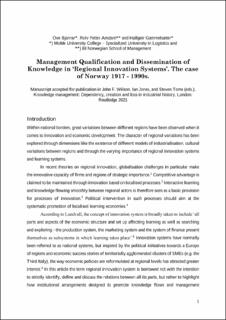Management qualification and dissemination of knowledge in regional innovation systems : the case of Norway 1930s–1990s
Chapter
Accepted version
Permanent lenke
https://hdl.handle.net/11250/3089186Utgivelsesdato
2021Metadata
Vis full innførselSamlinger
Originalversjon
10.4324/9780429059001-3Sammendrag
This chapter provides a detailed empirical foundation for discussing the role of dissemination of technical, organizational, and managerial knowledge within regional innovation systems. Accordingly, it focuses on qualification for management in regional innovation systems. In Norway, the policy of transferring knowledge to regional business has developed through three different regimes with its respective systemic traits. The first regime was active from 1917 until 1953, based on the cooperation between small business advisory branches in the regions, Smaindustrikontorer, and a semi-public advisory organisation Statens teknologiske institutt (STI), which was set up in 1916 to facilitate flow of knowledge to businesses by the use of liaisons or consultants. The second regime emerged in 1953 was created in connection with the Marshall Plan and the productivity drive in Europe. The third regime emerged after 1987, as the Government decided that the County authorities should take over the local branches of the STI and be responsible for developing the regional flow of knowledge.
